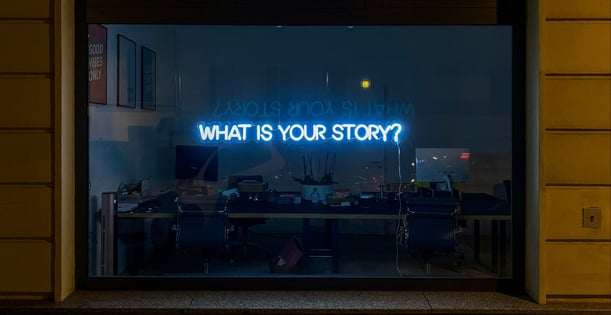Everyone has a unique story to tell, which is best shared from the first-person perspective. In many situations, especially in academic environments, people tend to concern themselves with how others interpret the stories they’d love to share. So many questions usually linger: “What will potential employers think of me?”; “How will my peers perceive me if I choose to reveal this aspect of myself?"; “What impression will I make on my professors?”
Indeed, these are valid questions, but in telling a story through ePortfolios, your story holds immense power. You matter and your story matters. As Ben Jenkins, the University Archivist and Associate Professor at the University of La Verne, shares in this episode of Digication Scholars Conversations, creating an ePortfolio gives his students the opportunity to say:
“This is who I am as a student, this is who I am in this increasingly digital world, and this is who I am in the incredibly global twenty-first century”
It's no news that the world is growing rapidly, and with advancements in technology comes a wide range of opportunities. As Associate Professor and University Archivist, Ben sees the ePortfolio as an opportunity for students to “leave their legacy as something that may be of value to students, generations from now.”

If students were asked to write about themselves thousands of years ago, it would have appeared on a “manuscript’s parchment paper,” joked Ben.
If we had gone a thousand more years before that, these stories would have appeared on stones or wooden tablets. However, we now come across these stories every minute as Tweets (or Xs), Instagram stories, memes, Facebook posts, etc. Because these stories are now a normal part of our lives, we wouldn’t think much of them. Most especially, we wouldn’t consider them legacies worth looking back at. However, Ben describes these as a time capsule with “historical documents that future generations are going to use to understand our lived experiences.”
In Ben’s public history classes, he first helps students to understand that everyone is a product of history. Every lived experience, as a part of a family, a religious group, a social circle, etc., leaves a legacy, a trace for future generations. These traces today are their digital footprints. These digital footprints are their contribution to history. Students are encouraged to be intentional about the story they want to tell using an ePortfolio. Decades from now, future students at La Verne may view these ePortfolios and build a better understanding of what life was like for past students and draw connections to their current experience as a part of the school community.
Ben sees this opportunity for students to connect to the La Verne community and share their stories through their ePortfolios allowing students to discover a greater feeling of belonging, especially so for minority students.
The University of La Verne was a predominantly white institution until recent decades, and through creating ePortfolios, students often share and celebrate their ethnic and racial diversity. Shared experiences often provide students with a sense of belonging and recognition of growth for how far minorities have come and their positive impact on the institution and surrounding community as a whole.
Other minority groups, like LGBTQ students, also benefit from utilizing ePortfolios. On their own terms, they get to share their identity and find a sense of belonging and acceptance within the school community. Also, the chance to tell their stories through ePortfolios gives students the opportunity to recognize and reflect on their role as valuable members of society.
You may want to read: Exploring Cultural Identity and Belonging as an Alaska Native Student With Shamai Thacker
Ben shares that some students struggle to see their own worth and value. These students may think of themselves as ordinary and not capable of doing anything significant. To help such students discover their unique contributions, Ben uses prompts to guide them through reflections on their lives. He gives an example of such a student, who, upon introspection, shared that he is a basketball coach at a high school. What could be more impactful than influencing the next generation of young people through team sports as a coach while still a college student? It is through this reflective process that students are able to begin to see their contributions to the community and recognize their power through the stories they share in their ePortfolios.
Ben also explains that as a digital frontier, he is very particular about the type of digital footprints students leave behind. Students are encouraged to be mindful of the materials they use to tell a story with ePortfolio for future generations. Rather than sitting back and watching history shape their narrative, they become active agents in determining what the future knows about them.
This episode of Digications Scholars Conversations is packed with how students use their ePortfolio to demonstrate global digital citizenship in the 21st century. Students are not merely limited to sharing their academic lives but are encouraged to bring together elements from every aspect of their lives.
Tune in to the podcast and enjoy this engaging episode as Ben Jenkins shares his personal journey and expertise on how ePortfolios have the power to shape the future and foster a profound sense of belonging through the power of individual stories.
